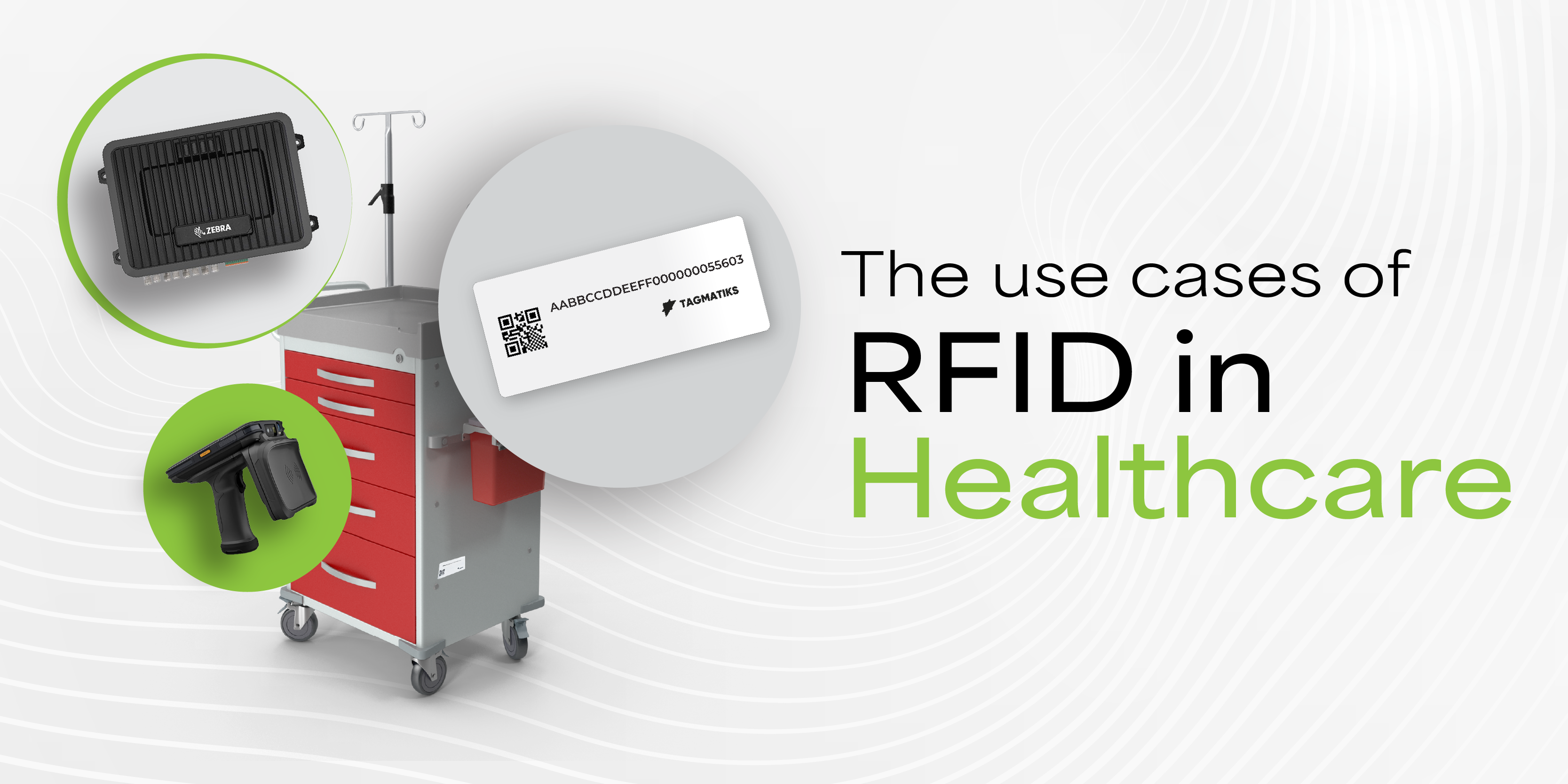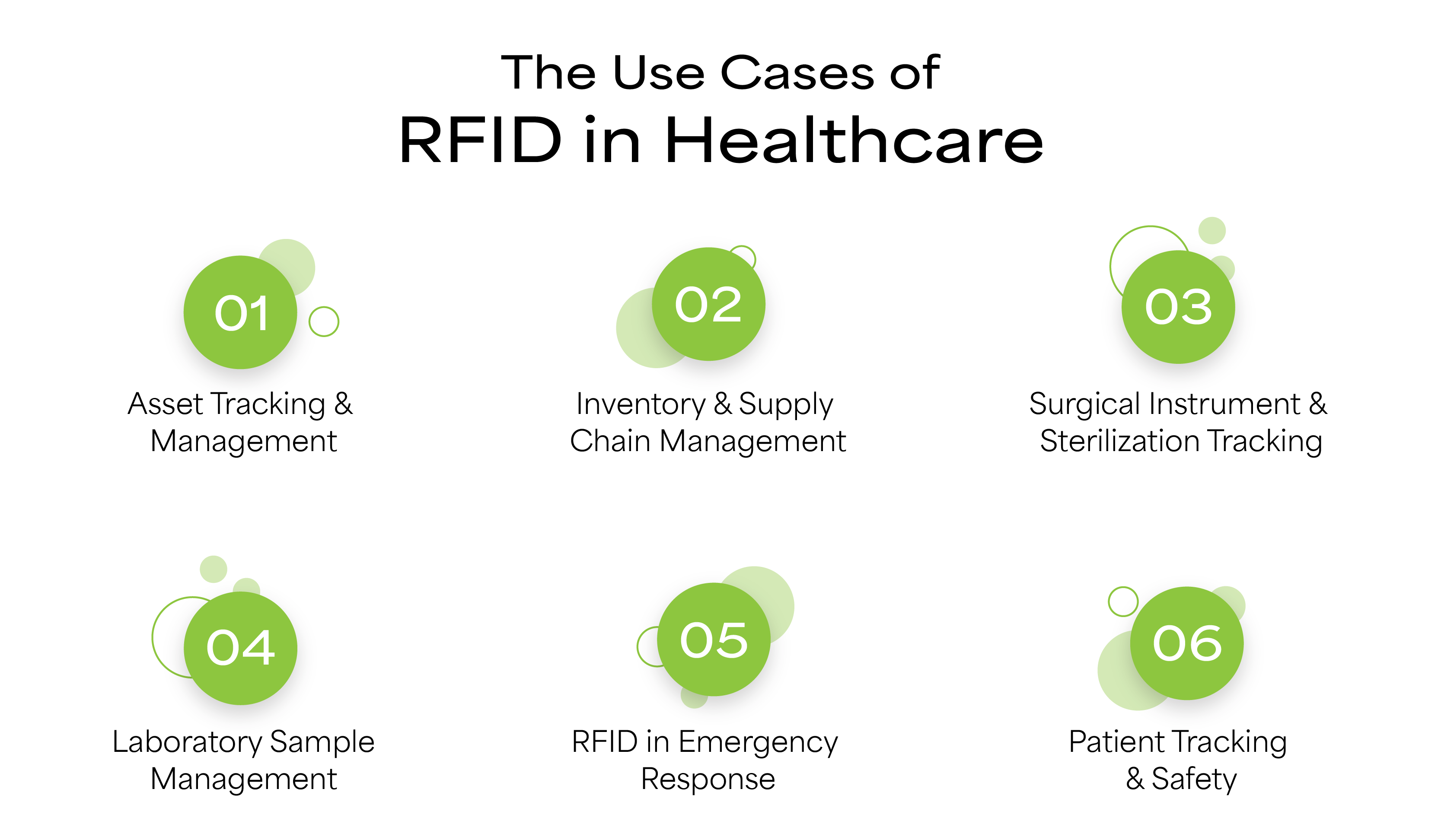The Use Cases of RFID in Healthcare: Enhancing Efficiency, Safety, and Patient Care
Introduction
In the modern medical landscape, healthcare providers continually seek ways to enhance efficiency, patient safety, and operational accuracy. One of the most promising solutions is RFID technology. Radio Frequency Identification (RFID) uses electromagnetic fields to identify and track tags attached to objects automatically. When applied in healthcare settings, RFID technology offers immense potential for streamlining operations and enhancing the quality of care.

RFID in Asset Tracking and Management
One of the most practical and widely adopted uses of RFID technology in healthcare is asset tracking. Hospitals and clinics often deal with a large volume of medical equipment such as infusion pumps, defibrillators, wheelchairs, and portable diagnostic tools. Manually tracking these assets can be time-consuming and prone to errors.
With RFID healthcare asset tracking, facilities can monitor the real-time location and usage of critical equipment. This reduces the chances of equipment loss, improves asset utilization, and ensures that staff can quickly locate the tools they need. By integrating RFID with hospital management systems, maintenance schedules and equipment lifecycles can also be automated and streamlined.
An additional benefit includes RFID on medical device inventory management, which ensures precise tracking of each medical device, its availability, and maintenance needs, greatly reducing downtime and enhancing patient care readiness.
RFID for Inventory and Supply Chain Management
Inventory management is a critical component of hospital operations. RFID enables automated tracking of medical supplies, pharmaceuticals, and consumables across the supply chain. Hospitals can use RFID tags to monitor stock levels, track expiration dates, and manage reordering processes more efficiently.
This reduces wastage from expired drugs and ensures that essential supplies are always available. Additionally, RFID technology in healthcare supply chains helps in ensuring compliance with regulatory standards by maintaining a detailed audit trail of all items.
Patient Tracking and Safety
RFID can significantly enhance patient safety and care quality. By issuing RFID-enabled wristbands, hospitals can ensure accurate patient identification throughout their stay. This reduces the risk of medication errors, incorrect procedures, and patient misidentification.
RFID wristbands can also store vital patient information such as medical history, allergies, and current medications. During emergencies or in high-pressure environments, this quick access to data can be life-saving.

Surgical Instrument and Sterilization Tracking
In surgical environments, cleanliness and accuracy are paramount. RFID tags can be affixed to surgical instruments and trays to monitor their use and sterilization status. This ensures that only sterilized tools are used in procedures, thereby reducing the risk of infections.
Hospitals can also use RFID to maintain records of how often tools are used, when they were last sterilized, and when maintenance or replacements are due. This not only boosts operational efficiency but also helps with regulatory compliance and audit preparedness.
Laboratory Sample Management
Managing samples like blood, tissue, or urine requires precision and traceability. RFID tags can be attached to sample containers to ensure that each one is correctly identified and tracked from collection to analysis.
This reduces the likelihood of sample mix-ups and losses, improving diagnostic accuracy. RFID also speeds up processing times, as staff can scan multiple samples simultaneously instead of handling them one by one.
RFID in Emergency Response and Disaster Management
In disaster scenarios or mass casualty incidents, quick identification and triage of patients are critical. RFID wristbands can store essential triage information, allowing emergency responders to make fast, informed decisions.
Mobile RFID systems can also be deployed in temporary field hospitals to track patient movement, manage supplies, and coordinate care. This increases the efficiency of emergency response and ensures better outcomes in chaotic situations.
Benefits of RFID in Healthcare
The benefits of RFID in healthcare are numerous:
Improved Efficiency: Automating asset and inventory management saves time and reduces manual errors.
Enhanced Patient Safety: Accurate identification minimizes the risk of treatment mistakes.
Better Compliance: Detailed tracking supports regulatory requirements.
Cost Reduction: Reduced loss, waste, and downtime contribute to lower operational costs.
Real-Time Data Access: RFID provides instant visibility into equipment location, inventory levels, and patient data, enabling faster decision-making and response in dynamic clinical environments.
Streamlined Workflows: By automating routine tasks like equipment check-ins, medication dispensing, and patient tracking, RFID helps free up staff to focus more on patient care and less on administrative work.
Overall, RFID technology in healthcare brings both operational and clinical improvements, making it an essential component of modern hospital infrastructure.
Future Outlook
The future of RFID in healthcare looks promising. As the technology becomes more affordable and sophisticated, its integration with other technologies like IoT (Internet of Things), AI, and blockchain will create smarter, more responsive healthcare systems.
From fully automated medication dispensing to predictive maintenance of medical equipment, RFID will play a central role in the digital transformation of healthcare.
Conclusion
RFID technology in healthcare is revolutionizing how hospitals and medical facilities operate. From tracking assets and inventory to enhancing patient safety and disaster response, the use cases are both diverse and impactful. As adoption continues to grow, the benefits of RFID in healthcare will become increasingly evident, paving the way for a safer, more efficient future in medical care.
Frequently Asked Questions (FAQs)
What is the role of RFID in healthcare?
RFID uses radio frequency signals to identify and track medical assets, patients, and supplies, helping hospitals improve efficiency and safety.
How does RFID improve asset tracking in hospitals?
RFID enables real-time monitoring of equipment like infusion pumps, wheelchairs, and diagnostic tools, reducing loss and ensuring quick access when needed.
Can RFID help with medical inventory management?
Yes. RFID tracks pharmaceuticals, consumables, and medical supplies, monitors expiration dates, and automates reordering to reduce waste and ensure compliance.
How does RFID enhance patient safety?
RFID wristbands provide accurate patient identification, medical history, allergies, and medication details, reducing risks of misidentification and treatment errors.
What is the use of RFID in surgical environments?
RFID tags track surgical instruments and trays, ensuring sterilization compliance and preventing infections by confirming only clean tools are used.
How does RFID support laboratory sample management?
RFID tags on blood, tissue, or urine samples ensure precise identification and tracking from collection to analysis, reducing mix-ups and speeding up processing.
How does RFID reduce operational costs in healthcare?
By automating asset tracking, inventory management, and patient identification, RFID reduces losses, downtime, and manual errors, lowering overall costs.
Recent Posts
-
How RFID Portals Transform Logistics & Warehousing Efficiency
Introduction Running a warehouse or logistics operation is no small task. Every day, teams manage sh …Feb 11th 2026 -
Most Common RFID Label Sizes and Their Applications
Introduction Radio Frequency Identification has become a cornerstone of modern tracking and inventor …Feb 2nd 2026 -
RFID Readers Buying Guide — Everything You Need to Know
Introduction Radio Frequency Identification (RFID) is a technology that uses radio waves to identify …Jan 19th 2026




